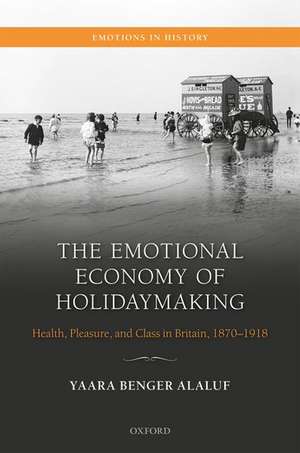The Emotional Economy of Holidaymaking: Health, Pleasure, and Class in Britain, 1870-1918: Emotions in History
Autor Yaara Benger Alalufen Limba Engleză Hardback – 4 mar 2021
Din seria Emotions in History
- 17%
 Preț: 230.24 lei
Preț: 230.24 lei - 30%
 Preț: 516.46 lei
Preț: 516.46 lei - 18%
 Preț: 168.59 lei
Preț: 168.59 lei - 26%
 Preț: 558.10 lei
Preț: 558.10 lei - 25%
 Preț: 494.04 lei
Preț: 494.04 lei - 26%
 Preț: 517.04 lei
Preț: 517.04 lei - 25%
 Preț: 515.93 lei
Preț: 515.93 lei - 5%
 Preț: 724.75 lei
Preț: 724.75 lei - 5%
 Preț: 235.06 lei
Preț: 235.06 lei - 17%
 Preț: 583.32 lei
Preț: 583.32 lei - 19%
 Preț: 192.30 lei
Preț: 192.30 lei - 30%
 Preț: 501.52 lei
Preț: 501.52 lei - 30%
 Preț: 587.18 lei
Preț: 587.18 lei - 26%
 Preț: 599.41 lei
Preț: 599.41 lei - 16%
 Preț: 582.53 lei
Preț: 582.53 lei - 25%
 Preț: 598.76 lei
Preț: 598.76 lei
Preț: 515.46 lei
Preț vechi: 688.34 lei
-25% Nou
Puncte Express: 773
Preț estimativ în valută:
98.63€ • 101.76$ • 82.31£
98.63€ • 101.76$ • 82.31£
Carte tipărită la comandă
Livrare economică 15-21 martie
Preluare comenzi: 021 569.72.76
Specificații
ISBN-13: 9780198866152
ISBN-10: 0198866151
Pagini: 210
Dimensiuni: 160 x 240 x 20 mm
Greutate: 0.46 kg
Editura: OUP OXFORD
Colecția OUP Oxford
Seria Emotions in History
Locul publicării:Oxford, United Kingdom
ISBN-10: 0198866151
Pagini: 210
Dimensiuni: 160 x 240 x 20 mm
Greutate: 0.46 kg
Editura: OUP OXFORD
Colecția OUP Oxford
Seria Emotions in History
Locul publicării:Oxford, United Kingdom
Recenzii
In her framing of the 'emotional economy' Yaara Benger Alaluf reveals a consumption matrix that allows the holidaymaker as a consumer to play a performative part in the product itself and shape it into the future. Her innovative and insightful questioning of the evidence also helps bring us closer to the lived experience of Victorian and Edwardian tourists honing in, as she does, both on the emotional power and sound of the seaside crowd and on the need to look closer at the feelings of individuals within it.
Her innovative and insightful questioning of the evidence also helps bring us closer to the lived experience of Victorian and Edwardian tourists honing in, as she does, both on the emotional power and sound of the seaside crowd and on the need to look closer at the feelings of individuals within it.
It deserves to be read widely as another approach to the study of the growth of mass holidays as one of the central, if intertwined, factors in the emergence of mass holidaymaking in Britain.
The Emotional Economy of Holidaymaking is an immensely erudite book that is structured in an intricate way and written in a demanding scholarly style with arguments interwoven and extended across successive chapters.
he Emotional Economy of Holidaymaking: Health, Pleasure, and Class in Britain, 1870-1918 by Yaara Benger Alaluf, explore different framings and experiences of happiness... Benger Alaluf's book approaches the question of the "cure" for the modern nervous or fatigued city dweller along these lines.
Her innovative and insightful questioning of the evidence also helps bring us closer to the lived experience of Victorian and Edwardian tourists honing in, as she does, both on the emotional power and sound of the seaside crowd and on the need to look closer at the feelings of individuals within it.
It deserves to be read widely as another approach to the study of the growth of mass holidays as one of the central, if intertwined, factors in the emergence of mass holidaymaking in Britain.
The Emotional Economy of Holidaymaking is an immensely erudite book that is structured in an intricate way and written in a demanding scholarly style with arguments interwoven and extended across successive chapters.
he Emotional Economy of Holidaymaking: Health, Pleasure, and Class in Britain, 1870-1918 by Yaara Benger Alaluf, explore different framings and experiences of happiness... Benger Alaluf's book approaches the question of the "cure" for the modern nervous or fatigued city dweller along these lines.
Notă biografică
Yaara Benger Alaluf is a historian and sociologist of tourism consumption and emotions. She completed her PhD at The Free University of Berlin in 2017 and was a research fellow at the Centre for the History of Emotions, Max Planck Institute for Human Development, Berlin. Her research focuses on the entanglement of therapeutic emotion knowledge and economic rationalization, as well as on the historical construction of the consumer as an emotional agent.
